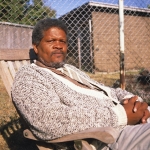for Jim Hendrix, hoodoo from his natural born
He frightens all the witches and the dragons in their lair
He cues the clear blue daylight and He gives the night its dare
He flaps His wings for warning and He struts atop a mare
for when He crows they quiver and when He comes they flee
In His coal black plumage and His bright red crown
and His golden beaked fury and His calculated frown
in His webbed footed glory He sends Jehovah down
for when He crows they quiver and when He comes they flee
and they sing their strange crude melodies and play their
weirder tunes and the villagers close their windows and the grave-
yard starts to heave and the cross wont help their victims and
the screaming fills the night and the young girls die with
open eyes and the skies are lavender light
but when He crows they quiver and when He comes they flee
Well the sheriff is getting desperate as they go their nature’s way
killing cattle smothering infants slaughtering those who block their way
and the countryside swarms with numbness as their magic circle grows
but when He crows they tremble and when He comes they flee
Posting hex-signs on their wagons simple worried farmers pray
passing laws and faking justice only feed the witches brew
violet stones are rendered helpless drunken priests are helpless too
but when He crows they quiver and when He comes they flee
We have seen them in their ritual we have catalogued their crimes
we are weary of their torture but we cannot bring them down
their ancient hoodoo enemy who does the work, the trick,
strikes peril in their dead fiend’s hearts and pecks their flesh to quick
love Him feed Him He will never let you down
for when He crows they quiver and when He comes they frown




















Comment form: